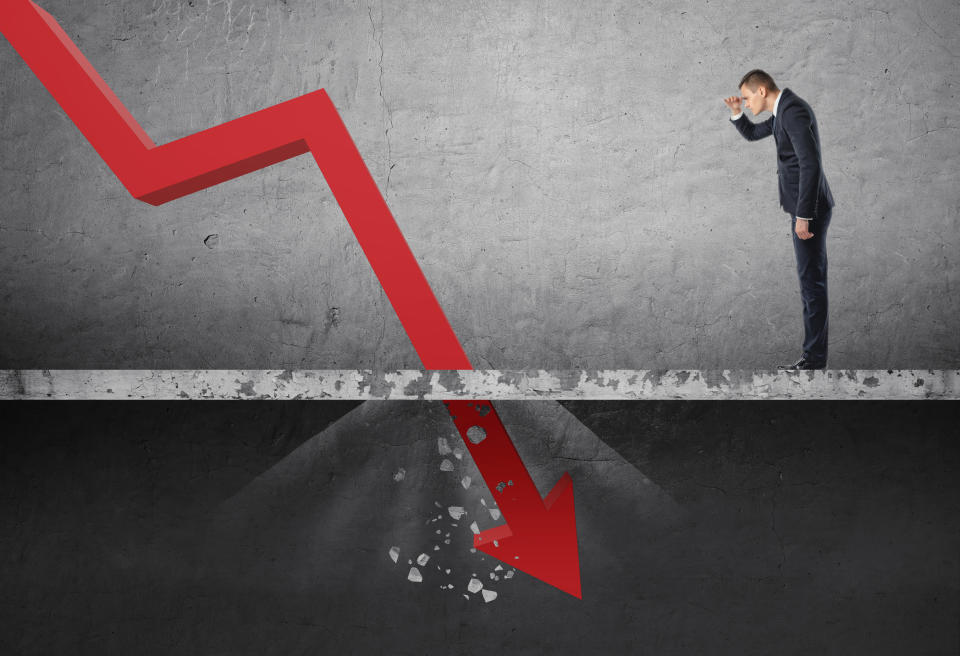3 Reasons Bed Bath & Beyond Is Still a Value Trap
Bed Bath & Beyond's (NASDAQ: BBBY) stock was cut in half over the past 12 months due to concerns about its negative comps growth, contracting margins, and tough competition from Amazon, Walmart, and other rivals.
A bruising battle with a trio of activist hedge funds forced CEO Steven Temares to resign in May amid accusations of "excessive compensation" and nepotism and exacerbated the pain for investors. Mary Winston, a board member who previously served as Family Dollar's CFO, took over as interim CEO -- but the retailer's recent first-quarter report indicates that Bed Bath & Beyond's business is still in serious trouble.

Image source: Getty Images.
Some investors might be tempted by Bed Bath & Beyond's low forward P/E of 5 and its forward dividend yield of 6%. However, this beaten-down stock is still a value trap, for three reasons.
1. Negative comps growth with contracting margins
Bed Bath & Beyond's comparable store sales growth stayed negative throughout 2018 as its gross margins contracted. That trend continued in the first quarter of 2019:
Metric | Q1 2018 | Q2 2018 | Q3 2018 | Q4 2018 | Q1 2019 |
|---|---|---|---|---|---|
Comps growth | (0.6%) | (0.6%) | (1.8%) | (1.4%) | (6.6%) |
Gross margin | 35% | 33.7% | 33.1% | 34.7% | 34.5% |
Source: Bed Bath & Beyond quarterly reports.
These figures indicate that Bed Bath & Beyond is using trying to boost its sales with markdowns, but the shoppers aren't biting. It didn't provide any guidance for its comps and gross margins, but it expects its full-year revenue to decline 3% to 5%. For comparison, analysts expect Walmart and Target's revenues to rise 2% and 4%, respectively, this year.
2. Vague turnaround plans
Under Temares, Bed Bath & Beyond's core turnaround play was Beyond+, a subscription plan that offers customers free shipping (with no minimum purchase) and 20% discounts on their entire orders for just $29 per year.
That loss-leading strategy was a desperate attempt to boost its sales and counter Amazon, Walmart, and Target's free delivery options. It finished the first quarter with 1.2 million Beyond+ members, up slightly from 1.1 million at the end of 2018. That marks progress, but it pales in comparison to Amazon's base of over 100 million Prime subscribers in the U.S.
Beyond+ reduced the retailer's gross margin 60 basis points during the first quarter and 40 basis points in the prior-year quarter, and those sacrifices didn't generate any comps growth. During the conference call, CFO Robyn D'Elia claimed that the company was "very encouraged" by the "incremental benefits" and "long-term potential" of Beyond+ -- but those vague comments gloss over the fact that it isn't generating meaningful sales growth.

Image source: Getty Images.
The rest of Bed Bath & Beyond's "transformation plan" sounds equally vague. It wants to boost its revenue by focusing on "destination" categories (like bed, bath, kitchen, windows, and tabletops), proprietary and private label brands, and improvements to its online and in-store experiences.
It wants to expand its gross margins by shifting sales toward higher-margin products, streamlining its supply chain, and tweaking its pricing and coupon strategies. As for its operating margin, it wants to cut costs with a more efficient labor model, fresh marketing strategies, and store lease negotiations. Unfortunately, none of these strategies addresses the elephant in the room: Most of the company's shoppers are simply going to Amazon, Walmart, Target, or IKEA and not looking back.
3. Trying to boost its earnings with wasteful buybacks
Bed Bath & Beyond's dire situation requires more investments in its e-commerce ecosystem and fresh marketing strategies, yet it still spent $81.5 million on buybacks, which reduced its diluted share count nearly 7% annually. It expects additional buybacks to boost its adjusted earnings 3%-7% this year.
Its buybacks during the first quarter were also poorly timed, since $81.5 million divided by 5.3 million shares equals an average price of $15.38 -- a near-40% premium to its current price. Management didn't disclose how many shares it planned to repurchase this year, but those buybacks will probably be equally wasteful and divert valuable resources from its other turnaround initiatives.
Finding the silver lining...
The bulls will argue that Bed Bath & Beyond's cash and equivalents rose annually last quarter, that its free cash flow can still easily cover its buybacks and dividends, and that it can shutter weaker locations, open smaller format stores, and dump its non-Beyond banners (like Cost Plus and Christmas Tree Shops) to recover.
That might eventually happen, but management's complacent attitude, dedication to its destructive Beyond+ strategy, and dependence on buybacks indicate that it's on the wrong path. In other words, it's cheap for a reason, and could easily burn value-seeking investors.
More From The Motley Fool
John Mackey, CEO of Whole Foods Market, an Amazon subsidiary, is a member of The Motley Fool's board of directors. Leo Sun owns shares of Amazon. The Motley Fool owns shares of and recommends Amazon. The Motley Fool has a disclosure policy.

 Yahoo Finance
Yahoo Finance 